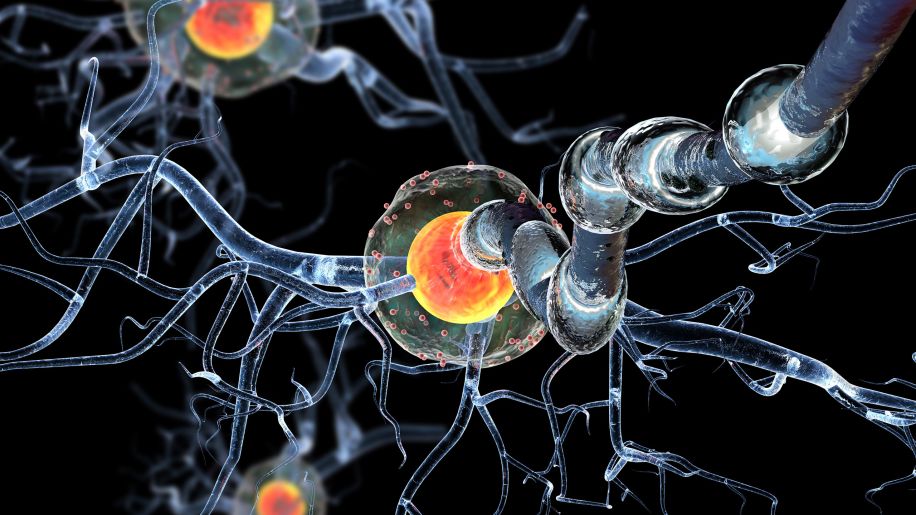Pain from multiple sclerosis? Here's how to get relief
More than half of people with MS report significant pain.

If you live with multiple sclerosis (MS), there’s a good chance you are familiar with pain. It can manifest in many different ways, whether it’s a random twitch or muscular pain that’s developed over years.
When it comes to physical symptoms, MS pain is either musculoskeletal or neuropathic, says Brian Steingo, MD, a neurologist with Sunrise Medical Group in Sunrise,… Show More
If you live with multiple sclerosis (MS), there’s a good chance you are familiar with pain. It can manifest in many different ways, whether it’s a random twitch or muscular pain that’s developed over years.
When it comes to physical symptoms, MS pain is either musculoskeletal or neuropathic, says Brian Steingo, MD, a neurologist with Sunrise Medical Group in Sunrise, Florida. Not all MS pain is physical, though; MS can also affect your mental health.
Whichever type of pain you are managing, these physician-approved methods may help your symptoms.
Show Less

Nipping neuropathic pain in the bud
If you’ve ever experienced burning or cold sensations, tingling, stinging, electric-type pain or a sensitivity to touch, it was likely neuropathic pain. “This is pain due to involvement of nerve pathways,” Dr. Steingo says, meaning the MS damages nerves located away from the site of the pain itself.… Show More
If you’ve ever experienced burning or cold sensations, tingling, stinging, electric-type pain or a sensitivity to touch, it was likely neuropathic pain. “This is pain due to involvement of nerve pathways,” Dr. Steingo says, meaning the MS damages nerves located away from the site of the pain itself. Trigeminal neuralgia is one kind of neuropathic pain, in which people with MS feel burning, typically on one side of their face.
Common treatments for neuropathic pain include anti-seizure medications such as gabapentin, pregabalin, carbamazepine and oxcarbazepine, Steingo says, as well as duloxetine and tricyclic antidepressants like amitriptyline and nortriptyline.
Show Less
Dialing down dysesthesias like the ‘MS hug’
Dysesthesias—burning, tingling, aching or tightening sensations around your body—are caused by neuropathy, and most commonly affect extremities like your legs and feet. They can be treated the same way you’d treat other symptoms of neuropathic pain, with anti-seizure medications and antidepressants.… Show More
Dysesthesias—burning, tingling, aching or tightening sensations around your body—are caused by neuropathy, and most commonly affect extremities like your legs and feet. They can be treated the same way you’d treat other symptoms of neuropathic pain, with anti-seizure medications and antidepressants.
The dreaded “MS hug,” a feeling of tightness in your chest or abdomen, is one way dysesthesias can manifest. In addition to taking your medications as prescribed, the National Multiple Sclerosis Society recommends wearing compression socks or gloves or using warm compresses to help ease uncomfortable sensations as they occur.
Show Less
Lessening Lhermitte's sign
Lhermitte’s sign, also known as Lhermitte's phenomenon, lasts only a few seconds, but the pain and discomfort it causes can be distressing. This MS-related symptom usually occurs when you move your neck downward, sending an electric-like shock down your back and into your arms and legs. Some refer… Show More
Lhermitte’s sign, also known as Lhermitte's phenomenon, lasts only a few seconds, but the pain and discomfort it causes can be distressing. This MS-related symptom usually occurs when you move your neck downward, sending an electric-like shock down your back and into your arms and legs. Some refer to it as "barber chair syndrome" due to the movement that brings on the pain. About 4 of 10 people with MS experience Lhermitte's sign at some point or another.
According to MS International Federation, medication won’t do much to help symptoms, since any pain experience is short-lived. However, anticonvulsants may help prevent episodes. A soft collar can also help by limiting the range of motion of your head and neck.
Show Less
Managing musculoskeletal pain
If you have musculoskeletal pain, you may experience symptoms such as muscle stiffness or spasticity, muscle spasms, joint pain, back pain and headaches. “Some of these may be directly due to MS, and others secondary,” Steingo explains. “For example, back or joint pain due to an abnormal gait.”
If you have musculoskeletal pain, you may experience symptoms such as muscle stiffness or spasticity, muscle spasms, joint pain, back pain and headaches. “Some of these may be directly due to MS, and others secondary,” Steingo explains. “For example, back or joint pain due to an abnormal gait.”
While over-the-counter (OTC) pain relievers don’t treat MS itself, NSAIDs and acetaminophen can be used to treat musculoskeletal pain as it occurs; speak with a doctor to see if they're right for you. If OTC medications aren’t enough to manage your pain, your doctor might prescribe something stronger. However, Steingo says, medications like opioids are usually given as a “last resort.”
Show Less
Moving to beat musculoskeletal pain
If you’re experiencing musculoskeletal pain, moving around may be one of the last things you want to do. However, physical activity—either through exercise or working with a physical therapist—can help ease pain. “Physical therapy and exercise are very important for overall wellness in people with… Show More
If you’re experiencing musculoskeletal pain, moving around may be one of the last things you want to do. However, physical activity—either through exercise or working with a physical therapist—can help ease pain. “Physical therapy and exercise are very important for overall wellness in people with MS,” Steingo says. “For muscular pain, therapy will include stretching and instruction on body mechanics.”
Another way to activate muscles and relieve some tension is through massage. Both Steingo and the National Multiple Sclerosis Society recommend massage therapy as a way to ease muscular pain, including leg pain.
Show Less
Prioritizing your mental health
Like physical pain, changes in mental health are a common side effect of multiple sclerosis. After your initial diagnosis, you may find yourself grieving—or maybe, for you, grief came later as your symptoms progressed.
Whether you are grieving or dealing with anxiety and depression, it’s important… Show More
Like physical pain, changes in mental health are a common side effect of multiple sclerosis. After your initial diagnosis, you may find yourself grieving—or maybe, for you, grief came later as your symptoms progressed.
Whether you are grieving or dealing with anxiety and depression, it’s important to seek support for your mental health. This can be confiding in family and friends, attending support group meetings or working with a mental health professional one on one.
If your mental health symptoms are causing you distress, tell your doctor. In addition to helping you manage your physical pain, your MS specialist can help you find a psychiatrist. A psychiatrist can help you determine whether antidepressants or anxiety medications are the additional support you need to take charge of your mental health.
Show LessFeatured Content


video


video

article

article
